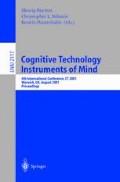Abstract
This paper discusses the tool aspect of the cognitive artifacts often referred to as ‘instruments of mind’. Having established the basic distinction between tool and instrument, the authors then go on to review the notion of artifact itself, and discuss the potential for mind change that is inherent in the use of ‘mental’ instruments such as the computer. It is pointed out that the relationship between the mind and its instruments is a dialectic one, and that the ‘reflexivity’ inherent in this relationship constitutes the very nature of our interaction with cognitive instruments, such as it is studied in Cognitive Technology.
Access this chapter
Tax calculation will be finalised at checkout
Purchases are for personal use only
Preview
Unable to display preview. Download preview PDF.
References
Ehn, Pelle. 1988. Work-oriented design of computer artifacts. Stockholm: Arbetslivscentrum.
Gibson, William. 1984. Neuromancer. London: Collins.
Gorayska, Barbara. 1994. ‘How not to lose the soul of language’. Journal of Pragmatics 22(5): 536–547.
Gorayska, Barbara and Jonathon P. Marsh, 1996. Epistemic Technology and Relevance Analysis: Rethinking Cognitive Technology. In Gorayska and Mey, eds. Cognitive Technology: In search of a humane interface. Amsterdam: North-Holland.
Gorayska, Barbara & Jonathon P. Marsh. 1999. ‘Investigations in Cognitive Technology: Questioning perspective’. In: Marsh, Gorayska & Mey, eds. Humane Interfaces: Questions of method and practice in Cognitive Technology, 17–43. Amsterdam: North-Holland.
Helmreich, Stefan. 1998. ‘Replicating reproduction in Artificial Life: Or, the essence of life in the age of virtual electronic reproduction’. In: Sarah Franklin & Heléna Ragoné, eds., Reproducing reproduction: Kinship, power and technological innovation. Philadelphia: University of Pennsylvania Press, pp. 207–234.
Illich, Ivan. 1973. Tools for conviviality. London: Calders & Boyar.
Langton, Christopher (ed.) 1989. Artificial Life. Redwood City, Calif.: Addison-Wesley.
Langton, Christopher, Charles Taylor, J. Doyne Farmer & Steen Rasmussen (eds.) 1992. Artificial Life II. Redwood City, Calif.: Addison-Wesley.
Langton, Christopher (ed.) 1994. Artificial Life III. Redwood City, Calif.: Addison-Wesley.
Lindsay, Roger O. 1999. “Can we change our minds?” In: Marsh, Gorayska & Mey, eds. 1999:45–69.
Marsh, Jonathon P., Barbara Gorayska & Jacob L. Mey, eds. 1999. Humane interfaces: Questions of method and practice in Cognitive Technology. Amsterdam: North-Holland.
Marx, Karl. 1971. Wage labour and capital. In: T.B. Bottomore, Karl Marx, Selected writings in sociology and social philosophy. Harmondsworth: Penguin. [1848]
Mey, Jacob L. 1982. ‘And ye shall be as machines’. Journal of Pragmatics 8(5/6):757–797.
Mey, Jacob L. 1996. ‘Cognitive Technology — Technological Cognition’. AI & Society 10:226–232.
Mey, Jacob L. 1998. ‘Adaptability’. In: J.L. Mey, ed., Concise Encyclopedia of Pragmatics. Oxford: ElsevierScience. pp. 5–7.
Mey, Jacob L. 2001. Pragmatics: An introduction. Malden, Mass. & Oxford, England: Blackwell Publishers. (Second, greatly enlarged and entirely revised edition). [1993]
Minsky, Marvin. 1986. The society of mind. London: Heinemann.
Norman, Donald A. 1986. ‘Cognitive engineering’. In: D.A. Norman & S.W. Draper (eds.), User-centered system design. Hillsdale, N.J. & London, England: Lawrence Erlbaum. pp. 31–61.
Norman, Donald A. 1993. Things that make us smart: Defending human attributes in the age of the machine. Reading, Mass, etc.: Addison-Wesley.
Ortony, Andrew. 1993. Metaphor and thought. Cambridge: Cambridge University Press. (Second edition) [1979]
Schank, Roger C. 2001. Scrooge meets Dick and Jane. Hillsdale, N.J.: Erlbaum.
Author information
Authors and Affiliations
Editor information
Editors and Affiliations
Rights and permissions
Copyright information
© 2001 Springer-Verlag Berlin Heidelberg
About this paper
Cite this paper
Gorayska, B., Marsh, J.P., Mey, J.L. (2001). Cognitive Technology: Tool or Instrument?. In: Beynon, M., Nehaniv, C.L., Dautenhahn, K. (eds) Cognitive Technology: Instruments of Mind. CT 2001. Lecture Notes in Computer Science(), vol 2117. Springer, Berlin, Heidelberg. https://doi.org/10.1007/3-540-44617-6_1
Download citation
DOI: https://doi.org/10.1007/3-540-44617-6_1
Published:
Publisher Name: Springer, Berlin, Heidelberg
Print ISBN: 978-3-540-42406-2
Online ISBN: 978-3-540-44617-0
eBook Packages: Springer Book Archive

